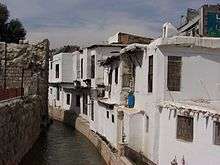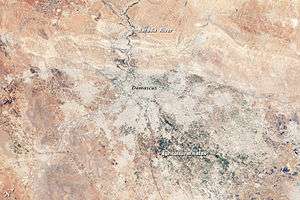Barada
The Barada (Arabic: بردى / ALA-LC: Baradā) is the main river of Damascus, the capital city of Syria.
| Barada Arabic: بردى | |
|---|---|
.jpg) Barada river in Damascus near the Four Seasons Hotel. The water level is uncharacteristically high in this view from the spring of 2009. | |
| Etymology | From barid, meaning 'cold' in Semitic languages |
| Location | |
| Country | |
| City | Damascus |
Etymology

"Barada" is thought to be derived from the word barid, which means "cold" in Semitic languages.[1] The ancient Greek name (Greek: Χρυσορρόας, romanized: Chrysorrhoas, means "streaming with gold").[2]
Topography and source
Throughout the arid plateau region east of Damascus, oases, streams, and a few minor rivers that empty into swamps and small lakes provide water for local irrigation. Most important of these is the Barada, a river that rises in the Anti-Lebanon Mountains and disappears into the desert. The Barada flows out of the karst spring of Ain al-Fijah, about 27 kilometres (17 mi) north west of Damascus in the Anti-Lebanon Mountains, but its true source is Lake Barada, a small lake that is also a karst spring located about 8 kilometres (5.0 mi) from Zabadani. The Barada descends through a steep, narrow gorge named "Rabwe" before it arrives at Damascus, where it divides into seven branches that irrigate the Al Ghutah (الغوطة) oasis, the location of Damascus. Eventually the Ghouta reached a size of 370 square kilometers, although in the 1980s, urban growth started replacing agricultural use with housing and industry.[3] The river has also suffered from severe drought in the last decades, mainly due to the lower rainfall rates and the large increase in the population in the area.[4] It also suffers from serious pollution problems, especially in the summer, where there is almost no flow and little water in the basin.
Biblical mention
Barada is identified as Abana (or Amanah, in Qere and Ketiv variation in Tanakh and classical Chrysorrhoas) which is the more important of the two rivers of Damascus, Syria and was mentioned in the Book of Kings (2 Kings 5:12). As the Barada rises in the Anti-Libanus, and escapes from the mountains through a narrow gorge, its waters debouch fan-like, in canals or rivers, the name of one of which, the Banias river, retains a trace of Abana.[5]
John MacGregor, who gives a description of them in his book Rob Roy on the Jordan, affirmed that as a work of hydraulic engineering, the system and construction of the canals, by which the Abana and Pharpar were used for irrigation, might be considered as one of the most complete and extensive in the world. In the Bible, Naaman exclaims that the Abana and Pharpar are greater than all the waters of Israel.[5]
Gallery
_p282_PASS_OF_SOOC_BARRADA.jpg) The upper valley of the Barada in the Anti-Lebanon Mountains 1855
The upper valley of the Barada in the Anti-Lebanon Mountains 1855 Barada river 1868
Barada river 1868 Barada river about 1930
Barada river about 1930
 Annotated view of Barada and Damascus with surroundings, as seen from space in 2013
Annotated view of Barada and Damascus with surroundings, as seen from space in 2013
See also
- Ghouta
- Water resources management in Greater Damascus
Notes
- Rihani, Ameen (2016). The Book of Khalid: A Critical Edition. Syracuse University Press. p. 455. ISBN 0815653328.
- Kraeling, Emil G. H. (2008). Aram and Israel: The Aramaeans in Syria and Mesopotamia. Wipf and Stock Publishers. p. 46. ISBN 1606083945.
- Collelo, Thomas, ed. (1988). "Land, Water, and Climate". Syria: a country study. Federal Research Division, Library of Congress. LCCN 87600488. Note: text doesn't have permanent URL. Click "Land, Water, and Climate" at link.
- http://www.alhayat.com/Articles/21639937/النظام-في-وادي-بردى--النهب-المستمر----تعفيش-وتحريق-وتنحيس
- Chisholm 1911, p. 6.
References

External links and further reading
| Wikimedia Commons has media related to Barada river. |
- Before Vanishing, a 2005 documentary short about the decline of Barada (French titles, no narration).

- De Chatel, Francesca (January 2008). "A Drought in Eden". Syria Today.